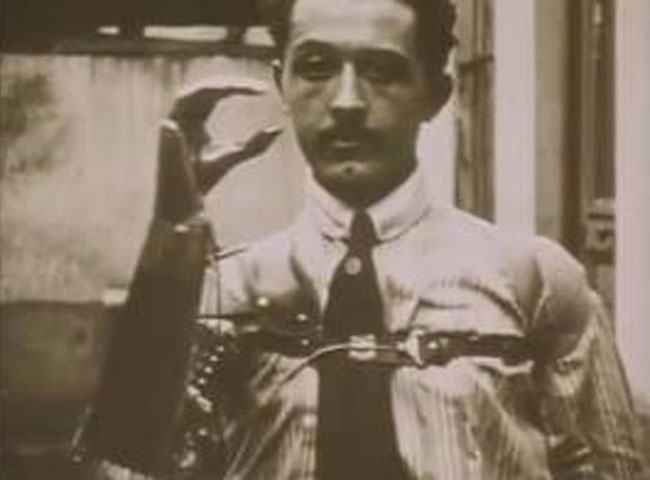Oh ! Homme
-
Réalisé par Yervant Gianikian, Angela Ricci Lucchi • Écrit par Yervant Gianikian, Angela Ricci Lucchi
-
Italie • 2004 • 71 minutes • Couleur et Noir & Blanc
- Réalisation :
Yervant Gianikian, Angela Ricci Lucchi - Écriture :
Yervant Gianikian, Angela Ricci Lucchi - Musique originale :
Giovanna Marini, Giovanna Marini
- Production (structure) :
Museo storico in Trento - Ayant droit :
Museo storico in Trento
- N° ISAN :
non renseigné
Résumé
Ce film sur l'après-guerre complète la trilogie de Yervant Gianikian et Angela Ricci Lucchi sur la première guerre mondiale, trilogie commencée avec Prigionieri della guerra et Su tutte le vette è pace. De l'emblème du totalitarisme à la souffrance physique individuelle, les réalisateurs, à travers cette représentation de la violence de l'homme chargée de rage au sortir de la guerre, entreprennent de faire un catalogue anatomique du corps blessé et portent leur attention sur les conséquences du conflit sur l'enfance, de 1919 à 1921. De la déconstruction à la recomposition artificielle du corps humain, ils cherchent à comprendre cette humanité qui se permet d'oublier et de répéter ces horreurs.
In their use of early 20th-century footage, the Gianikian-Lucchi team’s skill consists in giving emphasis to certain elements to make them tangible and meaningful to viewers, while slightly slowing down other sequences to emphasize their extreme violence. The filmmakers’ only commentary is their dogged work, revealing as it does the aesthetic beauty and political impact of these forgotten images. Unobtrusively interspersed among the images, Giovanna Marini’s music and voice underscore their emotional content.
Oh! Uomo brings to completion a trilogy on war that follows upon Su tutte le vette è pace and Prigionieri della guerra.
In this last part, Yervant Gianikian and Angela Ricci Lucchi focus on the aftermath of World War I and its consequences: the victory and spread of fascism in Italy, the distress of Europe’s orphans, the famine in Russia, the "broken mugs", the early stages of plastic surgery and the first prosthetic limbs.
Such descriptions of the film’s images hardly do justice to all their subversive violence. Beyond the fascinating sight of alpine troops hurtling down the slopes in negative, it is war’s relentless cruelty that looms large. The filmmakers’ tenderness towards the under-nourished children – Marini’s voice seems to caress them – is matched only by their anger at the faces disfigured by fire and firearms.
Their imagery is more incisive than ever. And more pathetic than ever are man’s efforts to repair by steel all the destruction so irremediably wrought by war.
Sélections et distinctions
- 2010 • San Sebastian International Film Festival • San Sebastien (Espagne) • Sélection
- 2005 • Visions du Réel • Nyon (Suisse) • Sélection
- 2005 • IFFR - International Film Festival Rotterdam • Rotterdam (Pays-Bas) • Sélection
- 2004 • Quinzaine des réalisateurs • Cannes (France) • Director's Fortnight
- 2004 • CPH:DOX - Copenhagen International Documentary Film Festival • Copenhague (Danemark) • Sélection
Comment avoir accès au film ?
-
Édition DVD
- Il n'existe pas d'édition DVD à notre connaissance
-
Accès VOD
- Il n'existe pas d'accès en VOD à notre connaissance
- Distribution
- Aide sur les moyens d'accéder à un film
